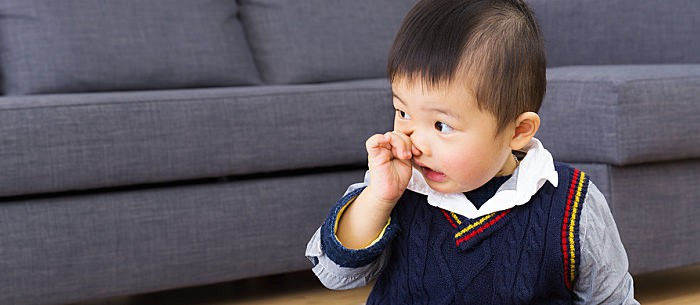There’s always that one kid with his finger up his nose on stage during the holiday recital. You either breathe a sigh of relief because he’s not yours, or you wave frantically for him to cut it out because he is! Inappropriate social behaviors such as nose-picking are something all kids embarrass their parents with, but they don’t know any better just yet. It takes time for them to learn about boundaries and social expectations. Knowing why they do it can help you find a way to break these bad habits and save some red faces at the next party.
- Types of Behavior
There are many things kids will do that they think are fine, but you know are inappropriate. These include nose-picking, lifting clothing, spitting, putting their fingers in their mouth, licking things, “adjusting” clothing, picking scabs, touching other people, and asking very blunt questions about others.Lorraine Fuller of Texas has a similar story to many parents, and shows why inappropriate behavior can actually have bigger repercussions than just embarrassment. “My daughter pulled up her dress during her preschool Christmas program at age 2,” she says. “She showed everyone her pull-up. That wasn’t a big deal, except that the kids were supposed to be potty-trained to be in the program. I was a teacher there, so I was especially aware of that rule.”
According to PBS Parents, there is always a reason for the behavior — and because kids aren’t great at communicating yet, they may be trying to tell you something through actions instead of words. They could be nervous or anxious about something, or frustrated with a particular situation. It could be that your child is simply bored or likes the way something feels. Keep an eye on the actions and have nannies be on the lookout to see if there are other consistent factors tied to it.
- How to Deal With Bad Social Habits
Early childhood expert Colleen Payne is the director of Montessori Country Day School and has seen just about every inappropriate social behavior. She says that when dealing with children who are still learning social norms, the best way to help alter their behavior is through gentle reminders that do not call undue attention to the issue or embarrass the child. Some of the clear phrases she suggests using include, “Please let your shirt cover your body to keep it safe,” “We use a tissue to clean our nose. Let me get you one,” “Food needs to stay inside our mouths while we are eating,” “Hands may go in pockets, but not in our underwear,” and “Please stay in your chair right now.”Dr. Serena Patterson, psychologist and author of “Hunter, Faith and the Ancestors,” says it’s important to deal with these issues quietly and without shaming the child. She suggests giving the child a nonverbal reminder that he is doing something inappropriate. “Some parents have a visual signal, such as Mom pulling her own ear, for when speaking about the behavior aloud would draw further attention,” she says.
- When Does It Become a Bigger Behavioral Concern?
Sometimes, children struggle with appropriate social behavior for longer than expected. Payne says, “When a child is not learning social cues, not responding to redirection, or is unmanageable at home and at school despite consistent reinforcement, it may be time to talk to your pediatrician about your concerns.” She suggests documenting examples from home, school and other settings to help your child’s doctor direct you to the right kind of help.
And check out
Behavior Disorders: Could Your Child Be Affected?
Dr. Patterson recommends that parents try to determine if the child is continuing the undesirable behavior because they can’t stop or because they don’t want to stop. If your child is under 6, she just might need more time to catch up to her peers socially. She recommends seeing a pediatrician if the child is 6 or older and still seems unable to suppress unacceptable behaviors in public. However, she adds, “If the child seems to have control and refuses to stop the behavior anyway, a counselor can help, even if the child is under 6.” If you aren’t sure if the behavior is intentional, talk to your pediatrician.
Rachael Moshman, M.Ed., has worked with thousands of preschoolers. She’s seen nose-picking and much worse, and knows most kids really do grow out of it.




